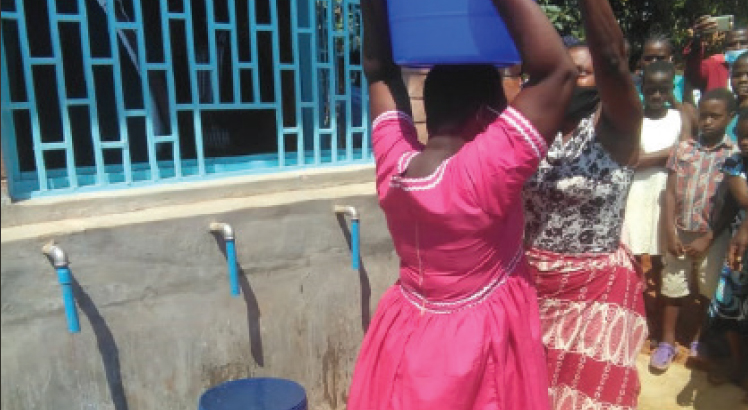Cost of water goes up by 50%
The country’s five water boards have increased their tariffs by an average of 50 percent, but consumers have threatened to go to court on the basis that the margin is unjustifiable.
Both Ministry of Water and Sanitation and Water Services Association of Malawi (Wasama) have confirmed the coming into effect of the new tariffs with effect from June 1 this year.

Wasama president Francis Munthali, who is also Northern Region Water Board (NRWB) acting chief executive officer, said yesterday that NRWB had its 65 percent increase approved.
In a separate interview, Blantyre Water Board (BWB) CEO Robert Hanjahanja confirmed that of its approved 90 percent tariff hike, the board has already implemented a 40 percent increase.
He said the remaining 50 percent will be effected on October 1 2023.
The Nation can also confirm that Central Region Water Board (CRWB) has been given 50 percent.
But Consumers Association of Malawi (Cama) executive director John Kapito has accused the boards of pushing their inefficiencies to the customers.
He said despite implementing reforms to improve efficiencies, the water boards have failed to improve their revenue collection, as such, do not deserve such a hike.
Addressing journalists yesterday in Blantyre, Kapito said that the consumer rights watchdog will seek a judicial review on the matter as they had hoped for a hike of not more than 20 percent.
He said raising the tariffs by such a magnitude will have implications on the cost of living and production.
Kapito claimed that non-revenue water stands at an average of 60 percent while government ministries, departments and agencies still owe the water board billions in arrears despite advocating for prepaid meters.
He said if not well articulated, the hike will lead to a continued rise in the cost of living and production as well as the cost of doing business in the country.
Kapito said: “What we are saying is that the proposed water tariff is very high. This is a tariff consumers do not want to see being implemented by government. And government should really be careful when they decide to gazette it.
“We are ready for them and we are indeed getting prepared to make sure that the moment this issue is done, we are going to the legal system and ask for a judicial review and we hope the courts will hear us, especially now that Malawians don’t have money and that water is supposed to be a public good.”
But Malawi University of Business and Applied Science associate professor of economics Betchani Tchereni said the water tariff is a necessary evil.
“We would rather have this now than let the water boards be in difficult situations,” he said.
In an interview last evening, Minister of Water and Sanitation Abida Mia said it was necessary to raise the water tariffs to match with the rising production costs, meet tax obligations and losses suffered from non-revenue water.
She said: “To ensure that people have properly treated water, we had to raise the tariffs. Since 2021 we had not been able to raise the tariffs because of Cyclone Ana and the cholera outbreak.”
However, Mia said public water kiosks have been spared from the rise.
The hike come against a background of unmet key performance indicators that the water boards signed with Cama on behalf of Malawians to increase efficiency and revenue collection.
In March this year, the country’s five water boards unveiled their proposal in Lilongwe when the Ministry of Water and Sanitation met the Parliamentary Budget Cluster Committee on Agriculture and Food Security and Natural Resources and Climate Change to discuss the 2023/24 National Budget.
NRWB proposed a 55 percent increase, Southern Region Water Board (SRWB) and CRWB bid for a 50 percent hike each while Lilongwe Water Board (LWB) proposed a maximum of 35 percent.
The water boards say the proposal is justified in the wake of the May 2022 devaluation of the kwacha by 25 percent and government’s delay to implement proposed tariff increases in the previous financial year despite Cabinet’s approval.
The tariff increase in the previous financial years hovered between 15 and 40 percent, depending on the water board.
The water boards previously argued that the current tariff is below full cost recovery as they lose over K23 billion annually to MDAs in unpaid bills and K30 billion to non-revenue water.





